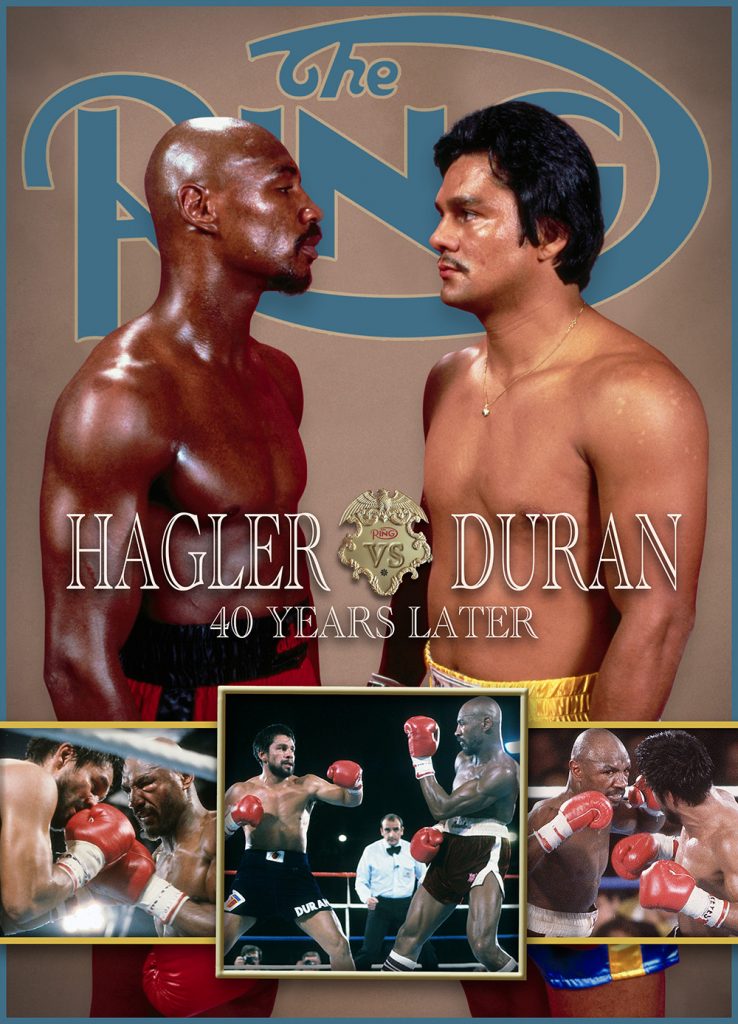Best I Faced: Darren Barker
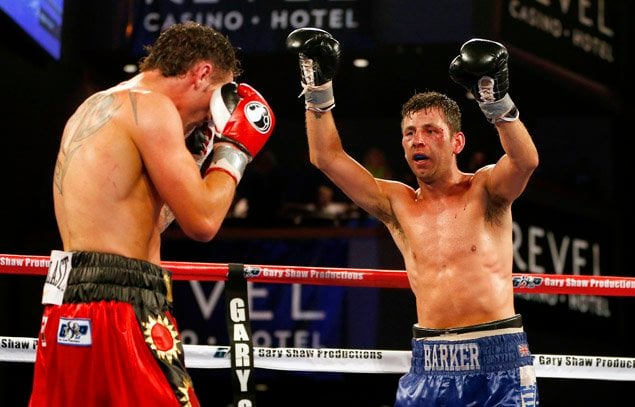
English middleweight Darren Barker used his boxing skills to win the British, Commonwealth and European titles before completing his mission by claiming a middleweight world title 10-years ago on Thursday (August 17).
Barker, who was the eldest of four children, was born in Harrow, West London on May 19, 1982. However, he grew up in Barnet in North London.
“I don’t have that background where I came from a warzone,” Barker told The Ring. “Barnet is a nice area, there are rough parts. I went to a really rough school but generally it was really nice. I played a lot of football. We were half hour away from the West End of London. It was brilliant. Great family, great upbringing.”
His father, Terry, had been a successful amateur, winning the well-regarded ABA title at 48 KGs in 1980.
“That was his world title, I was born and messed everything up!” quipped Barker laughing.
Darren and younger brother Gary wanted to follow in their father’s footsteps.
“[My dad] was the reason I boxed, he never pushed me into it, I just wanted to make him proud,” said Barker. “I think I had my first fight at 12, 13 but I was brought up around boxing. I remember watching Mike Tyson.
“I started at Finchley Boxing Club in North London and moved to East London and boxed for the famous Repton. I have some really fond memories of traveling to Repton every day with my brother on the train. That was when my career [took off.] It was like going from Primary school to University. It took me to another level. Tony Burns being a massive influence.”
Although Barker was never able to emulate his father success by winning the ABA championship, he used the prestigious tournament as a springboard to getting onto the England national team and fighting and winning at a multi-nations event in Hungary. That lead to him representing his country at the 2002 Commonwealth games in Manchester, England, where he won gold.
“My first seven fights for England were seven fights and two gold medals – it went crazy,” he said proudly. “I went to the World Championships in 2003, lost to [future welterweight champion] Andre Berto in the quarterfinals, which I 100 percent won. I’m not a sore loser, I’d be honest, if I thought I lost the fight. I was seven points up going into the last round and lost by two.
“I was traveling the world, something my dad said I would if I got good at the sport. It was the time of my life.”
Barker hoped to parlay that into going to the 2004 Olympics, but the light middleweight class was abolished, and he was small for middleweight but too big for welterweight. He tried to make middleweight but lost to future professional world champions Andy Lee and Karol Balzsay in qualification tournaments and didn’t want to go through another four-year cycle and elected to go professional.
Barker, who estimates he had in the region of 100 amateur contests going roughly 85-15, turned professional against wily veteran Howard Clarke on a Carl Froch undercard in September 2004.
“I remember [manager/ trainer] Tony [Sims] telling who I was fighting on my debut,” said Barker, who earnt £4,000 [just under $5,000 USD.] “I was well up on boxing at the time, I knew everyone in and around my weight and knew Howard Clarke had fought for a world title against Fernando Vargas. I remember telling my dad who my opponent was and he goes, ‘Is he any good?’ I said, ‘He’s a journeyman but he’s fought for a world title once upon a time.’ he goes, ‘WHAT!’ he was shitting himself; he was petrified because I was fighting a guy who had fought for a world title on my debut, not understanding [Clarke] was now fully bedded into the journeyman role.
“My debut was a six-rounder, I had Paul Thomas, an experienced referee, he didn’t let me get away with much. I learnt a lot from Howard and the referee, what you could and couldn’t get away with. It was a good welcome to the pros. Every single box was ticked, I went the six-rounds, I was in there with an experienced fighter, and I won comfortably.”
Over the next couple of years, Barker continued his journey of moving through the ranks. He had to overcome some adversity by getting off the canvas to stop Conroy McIntosh in seven-rounds.
In his 12th outing he won the Southern Area title by outpointing Hussein Osman over 10-rounds in September 2006.
“I remember Tony saying to me when I first turned pro, ‘This is how we’ll route out your career. Southern Area, British, Commonwealth, European, world title.’ I remember saying, ‘Do you think I can do that?’ he said, ‘If you put your mind to it, with your talent, there’s no reason you can’t.’ And that was the first rung on the ladder. It was the first belt I’d ever won. I was proud to have won that title.”
Tragically Barker’s younger brother Gary passed away in a car accident in the fall of 2006. It threw Barker’s life and career into a tailspin.
“I stopped for almost a year, I was in a bad place. I didn’t want to box anymore,” he said, still clearly moved by the tragedy. “Then as time passed, I thought, ‘If I can’t do it with my brother, I’ll do it for him.’ Every rung on that ladder, every title, though it was a dream of mine, to win those, it was more to win them so I could dedicate them to my brother. That became my life’s work.”
When Barker returned, he knocked the ring-rust off before claiming the vacant Commonwealth title against previously unbeaten Ben Crampton.
“To win my first major title at the famous York Hall, where I’d had most of my amateur fights was a special moment,” he said. “I’d won the Commonwealth games gold medal and then to win the Commonwealth title as a pro, it was almost like a double. It was a very emotional night for me being able dedicate my title to my brother.”
The likeable Londoner made three defenses of his Commonwealth belt before zeroing in on the British title in late 2009.
“I was scheduled to fight the champion Wayne Elcock, the champion and I always felt you had to beat the champion,” said Barker, who ended up facing and stopping Danny Butler (TKO 7) when Elcock was injured. “I was gutted I wanted to beat the champion. It doesn’t take the shine away; I was still crowned the British champion. I remember thinking I’m in the record books now. It was a special, special moment.”
Barker didn’t stay at domestic level and was offered a shot at the vacant European title in his next fight against battle-hardened Frenchman Affif Belghecham in April 2010. Although he successfully took the next step in his journey it came at a price.
“I had a really hard fight with Belghecham, on paper he didn’t look the strongest, Andy Lee schooled him and had a torrid last couple of rounds, which was basically a mirror image of my fight,” he recalled. “I absolutely leathered him for first half of the fight and then I was under the cosh a little.
“The reason for that was because I’d started to struggle badly with my hips, I couldn’t run, that was the start of my journey with hip injuries. As soon as that fight finished, I went for a scan and the surgeon told me I had to have an operation, both my hips were wearing the cartilage away. I had to have them shaved, they pull the hip out of its joint and shave the bone. I needed both done but they could only do one at a time. So, I had the first one done, which was my left hip, which I had to pay for myself, which was £7,000. I couldn’t get insured being a boxer. I was out for a year.”
Due to the injury, Barker had to vacate his EBU title, but when he returned he boxed for his old vacant title against seasoned Italian Domenico Spada. It was a tough fight, but Barker’s pedigree shone through, and he won a 12-round unanimous decision.
At that time Sergio Martinez was the class of the division and was coming off a highlight reel knockout over Paul WIlliams and then dominated well-regarded Sergei Dzindziruk. Social media helped create the opportunity and Barker was only too happy to run with things from that point.
“[Martinez] couldn’t get an opponent at the time,” explained Barker. “That whole Martinez fight came about through Twitter. Randomly someone @ me in a tweet, saying would I fight him? I said, ‘Yeah, I’d love to put my skills against one of the great middleweights of all time.’ Before I knew it, his manager jumped on it. The next thing I knew me and Eddie [Hearn] are on a plane going to New York for a press conference, it literally happened that quickly.
“Doing a press conference on top of a big skyscraper in New York. The press almost laughing at me, thinking, ‘Who’s this guy? He doesn’t stand a chance.’ No one wanted to go near Martinez.”
When the fight came, Barker had his moments before unravelling in the penultimate round against the vastly more experienced Argentine fighter in Atlantic City in October 2011.
“I look back at that fight and the majority of my thoughts being annoyance,” he said. “I think I could have done better. I think I showed him too much respect. I’m not saying I’d have beaten him; I certainly think I could have done better. I felt I lapped up the occasion too much and I didn’t really give it my all.
“It was alien to me; I’d never been in there with an elite level fighter, and I thought ‘How good are these guys? Am I good enough? Am I worthy? Are all these guys right laughing at me at the press conference for taking this opportunity? I just think I held back a little.”
After the loss, Barker had surgery to his other hip and was sidelined for over a year.
When he returned, he scored a pair of stoppage wins and then challenged IBF middleweight titlist Daniel Geale in Atlantic City in August 2013.
“He was actually a unified champion, but he vacated the WBA because he had a mandatory against [Gennadiy] Golovkin,” he recalled. “He vacated that to allow the fight with me to go ahead, which I’m a bit gutted about because it would have been nice to have been unified champion, but it was my opportunity to fight a champion.
“It was a close fight, and I got a brutal body shot [in Round 6] that dropped me, and I remember thinking, ‘Bollocks!’ I was in absolute agony. It was a great shot. There were a number of emotions. I could see visions of my brother – it was mad. It gives me goosebumps thinking of that nine and a bit seconds now. It was full of mad visions and overriding pain but somehow, something just helped me get to my feet, that desire, that will to win, that last rung on the ladder, my whole life’s work, the blood sweat and tears, the sleepless nights, the agony, the hip operations, everything was that moment there and could have all came crashing down if I didn’t rise to my feet and I did. I got to my feet. I look back at my career and that’s the standout moment because that’s the moment I proved I’m tough, I’m worthy of being a world champion.
“It was very competitive, Round 7, arguably the best round of fight for me. I boxed very well, aggressive counterpunching and that continued. I tried to nullify his threat and his threat was his superb engine. I tried to outwork him, especially down the stretch.”
Barker felt confident he’d done enough to win as he waited for the judges’ scorecards to be read out.
“I knew I’d won that fight,” he said. “The only concern was I was the away fighter. I’d been dropped and in the chief support, the promoter’s other fighter had lost. Those thoughts came into my mind. Then Eddie came in and said, ‘Could be close.’ And then the legend that is Michael Buffer got on the mic and for what felt like an eternity, him reading out the scorecards.”
The first scorecard came in 114-113 Geale, which was followed by 116-111 Barker and then 114-113 “and the NEW IBF middleweight champion, Darren Barker!”
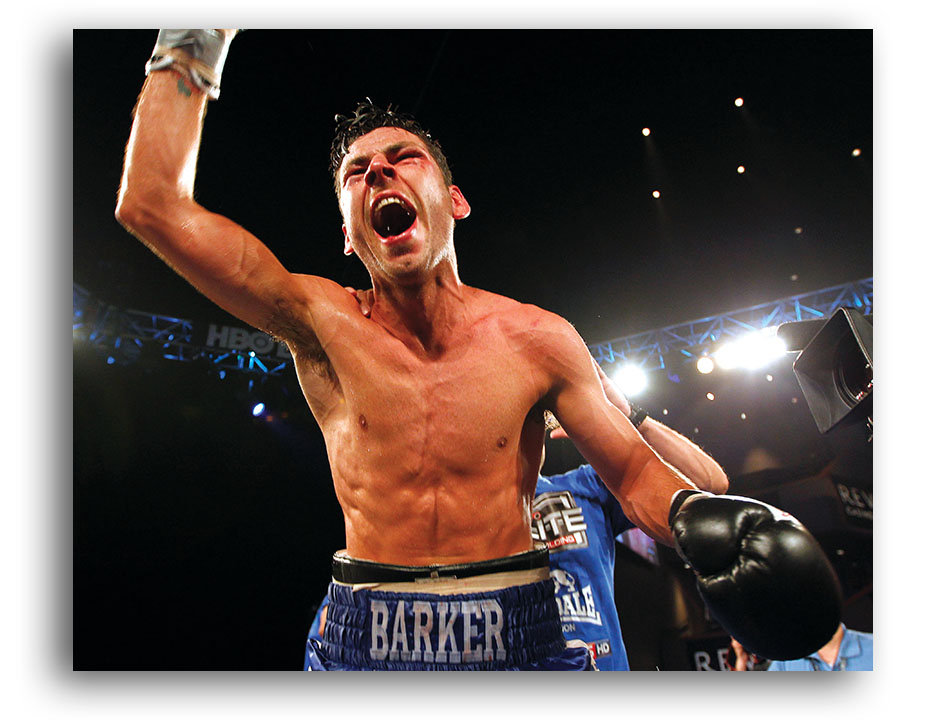
Darren Barker celebrates his world title winning victory over Daniel Geale.
“Initial feeling was I was upset because it almost felt like the time I’d spent dedicating to my brother, it was almost letting go to an extent,” he said. “I was proud of myself; I was very emotional. It didn’t take long for the smiles to come on my face. I was beaming with pride that I was able to do it for him. I try not to make a big deal out of it because people have been through much worse than me, but my body was absolutely knackered. I didn’t have any right in achieving what I achieved. I had the talent by my body wasn’t capable, really. Somehow, I managed to do it, that’s why I thank my late brother for helping me.”
Barker celebrated with a couple of beers after the press conference and then headed to New York where he stayed for two nights.
After enjoying the moment, it quickly became about what was next. However, that wasn’t something that particularly bothered Barker.
“I didn’t want to fight ever again, if I’m honest,” he admitted. “I had no ambition or desire [to be one of these world champions who fights on.] I just wanted to win a world title and I’d won it, but I hadn’t earnt enough money at that point.
“I’d bought my house with the Martinez money; I didn’t get much as a voluntary for the Geale fight. I wanted to earn some money and the [Felix] Sturm fight was there. I got a good pay day because they wouldn’t leave Germany, he had a deal with a network.”
Barker travelled to Stuttgart, Germany in December 2013.
“He was my mandatory, so it was either he paid us well or he lost his shot,” added Barker, who said the Sturm fight was a career high payday, which he called, ‘ridiculous’ money. “Though the ambition, the drive and the desire had faded considerably, I still believe I had enough in the locker to beat Sturm and the goal was to beat him. People say I went into that fight injured but I went into the last six fights injured, I wasn’t 100 percent for a long time. I genuinely didn’t want to fight anymore. The plan was to beat Sturm and sail off into the sunset.
“It wasn’t to be. My hip went in the first round, it was a shame. I just never recovered. I just couldn’t get into the fight. I watched a long time after, I wanted to erase if from my memory. I was proud of myself because I know how much pain I was in, I could have stayed on the canvas, but I didn’t, I got to my feet and was the last man throwing punches when Tony threw in the towel in.
“I wanted to go out as winner, defending my title and retire but it wasn’t meant to be but there’s no regrets.”
In retirement, Barker remains very much involved in boxing as a commentator for DAZN and also co-owns a management company called International Sports Group with Joe Calzaghe.
Barker, now 41, is married, has four children and lives on the outskirts of London, in St. Albans.
“I got to fulfil a dream, boxing’s my life, still is but it’s nice to look back,” he said visibly happy. “I feel like I completed boxing. I did what I set out to do and not many do that. My life is so good, I thank God, I thank the people around me.”
He graciously took time to speak to The Ring about the best he fought in 10 key categories.
BEST JAB
Sergio Martinez: “Even before boxing him, I saw he used fire his shots off from his hip, he used to carry his lead hand low and I used to think, ‘I’ll be able to beat him to the jab, there’s no way he’ll be able to fire the shot from his hip without me seeing it.’ Also, I had done a lot of sparring with Carl Froch, hundreds of rounds, and Carl was quite similar, he used to have a low lead hand and he used to fire it up from the hip and I was so used to that that I thought I’d be fine but he caught me far too often with the jab [Laughs.] It was speed, pinpoint accuracy and [he was] razor sharp with the shot.”
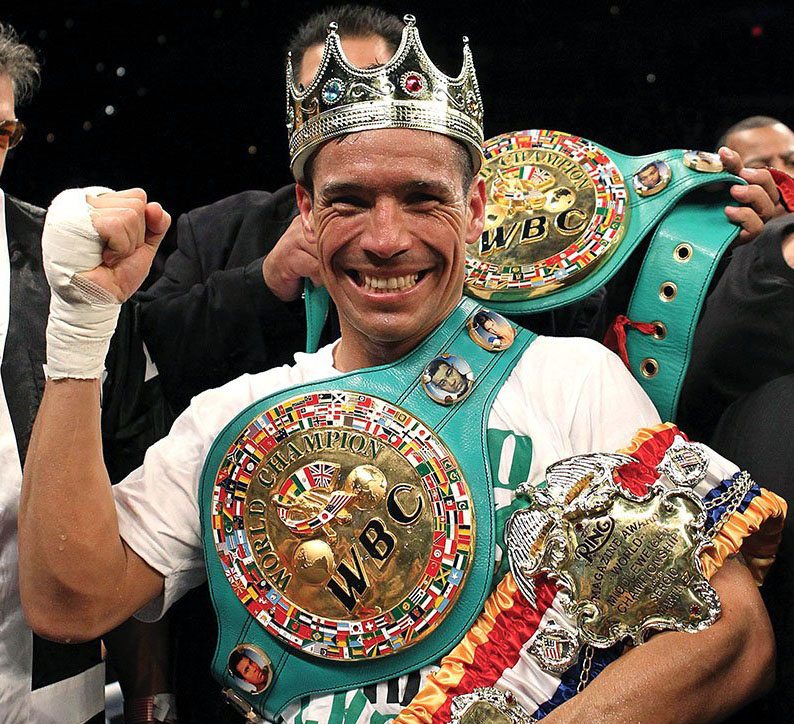
Sergio Martinez with his Ring Magazine and WBC middleweight crowns after icing Paul Williams in their 2010 rematch. Photo by Al Bello/Getty Images
BEST DEFENSE
Daniel Geale: “He was there to be hit but Daniel Geale was quite compact. I changed my tactics quite early in that fight because I was falling short with the shots. People forget he was a decorated amateur, he won the Commonwealth Games the same year I did, I think he was an Olympian. I had to get close to him and that’s why the fight turned out the way it did because I forced myself onto him. He had the knack of just taking the sting out of shots and I just missed, not landing cleanly.”
![]() BEST HANDSPEED
BEST HANDSPEED
Martinez: “I was always told by Tony Sims that to go through the levels and to become world champion, you’ve got to be lightning fast and that’s exactly what Sergio Martinez was. Not just with his hands but his feet and his reactions. He was very, very fast.”
BEST FOOTWORK
Geale: “Probably Geale. I know Martinez spent a lot of time on the backfoot but it was the way that I had to change tactics because Geale bouncing in and out of range. I thought, ‘To win this title I’m going to have to rip it away from him.’ It was my desire and will to win, plus the fact he was crafty on his feet. If you watch the early rounds of the fight, you’ll see what I mean. I fell short a few times and I did fight out of character; it was because of his crafty footwork.”
SMARTEST
Martinez: “I fought some good fighters but when you’ve fought someone as good as Sergio Martinez it’s hard to not give him every category. He did what I should have done at the half way point. I was boxing well, frustrating the champion and the plan was after six rounds to turn the screw and get going, he done that and I didn’t and he got on top of me in the second half of the fight. I kick myself because I know I had it in me to do it but it was the experience, he just knew how to do it. I would say I was the physically stronger, I could match him for handspeed but he had that difference in experience that told on the night. The experience gained from that fight was invaluable going into the Geale fight.”
STRONGEST
Felix Sturm: “By this time, I had changed the way I fought, there was a lot of injuries, I was struggling with but mainly the hip and there for I was in front of my opponents more having to mix fire with fire. The plan was quite simple, move be elusive but I just couldn’t do it. I was forced to stand in front of him. He was physically strong, nice high guard, typically German, economical style but I felt that presence in there.”
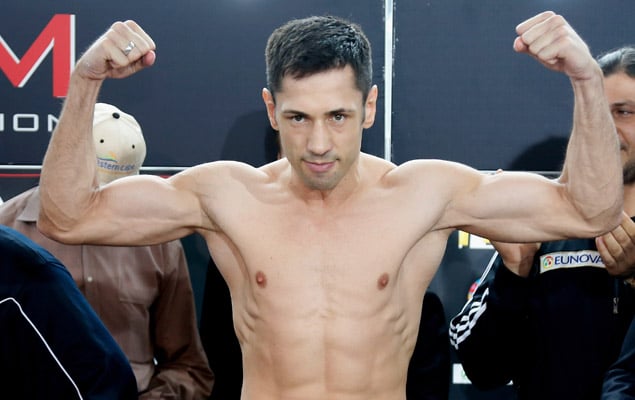
German star Felix Sturm, a four-time middleweight beltholder, flexes before his fight with Geale. Photo by Friedemann Vogel/Bongarts/Getty Images
BEST PUNCHER
Conroy McIntosh: “I fought a guy in my 10th or 11th fight, Conroy McIntosh from the Midlands. It was same day weigh in. I got to the York Hall and Tony went, ‘Get on the scales, there’s your opponent’ I remember laughing at Tony going ‘There’s no way I’m fighting him, he’s massive, he’s a man mountain.’ He wasn’t tall but muscles on muscles. It was my opponent. I’m in changing room before the fight and they changed the running order from being third of fourth to being first on. So, I wasn’t quite warm. No excuses. I got straight in the ring, won the first round easy, I think it was the end of the second round, I got a bit lazy, a bit complacent. I was leagues above him and I did something Tony always told me not to do and that was lean back on the ropes with your hands down. I’ve done that and he’s stepped in and swung a big right hand, clean on the chin and dropped me, I got up and he drops me again. That was the hardest I’ve been hit by a single punch without a doubt. I still can’t remember the second round. I ended up stopping him in the seventh round.”
BEST CHIN
Domenico Spada: “There was an Italian I fought the second time I won the European title, Domenico Spada. I wasn’t sitting down on my punches as much as I was near the end of my career where I had a lot of success but I was still very sharp, very accurate. I got a lot of my stoppages earlier in my career through speed and accuracy and wearing my opponents down. I couldn’t really put a dent in Spada, a tough man, physically very strong. I caught him with some really piecing, sharp shots that would have dropped a fair few opponents but he was there, he was rugged; he just swallowed them and ate ’em all up.”
BEST BOXING SKILLS
Martinez: “I can’t overlook the skill set of Sergio Martinez. Just an all-around very good fighter. That was a fight where the pace was low, I was really enjoying the competition. They say the physical chess, that’s what I loved about boxing. I was in my element against Martinez for six-rounds, this is brilliant, this is what I live for.”
BEST OVERALL
Martinez: “There are different attributes I’d take from a couple of different fighters. The engine and work rate from Daniel Geale, the physical strength from Felix Sturm, the chin of Domenico Spada but if I had to single out one, it would be the great Sergio Martinez. I probably got the last good Martinez; I could have done with him a fight later. He was just all-around very good. A very good man, a nice man, someone I’m proud to say I boxed.”
Questions and/or comments can be sent to Anson at [email protected] and you can follow him on
Twitter@AnsonWainwright
SUBSCRIBE NOW (CLICK HERE - JUST $1.99 PER MONTH) TO READ THE LATEST ISSUE
